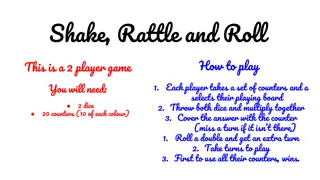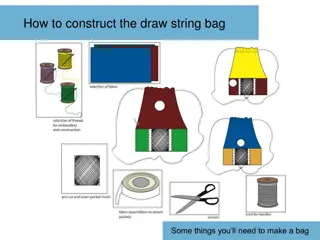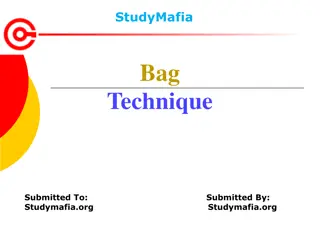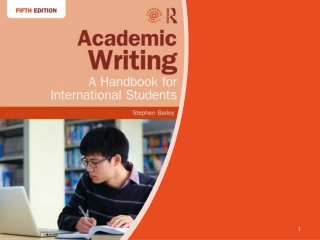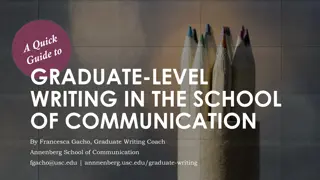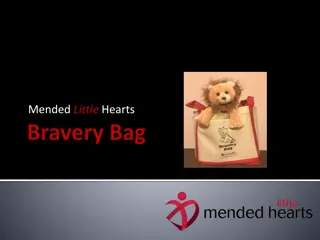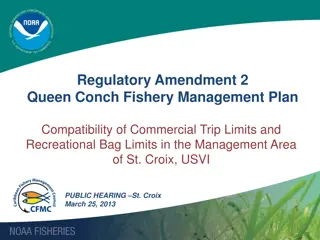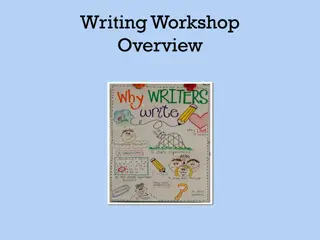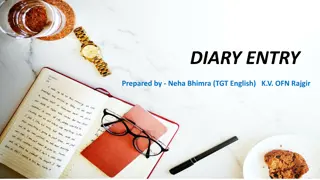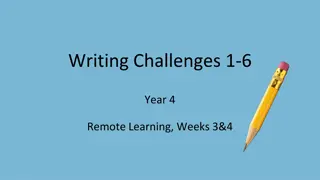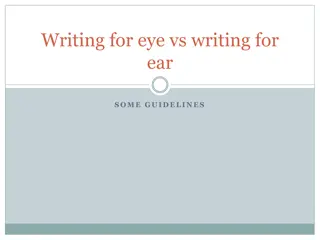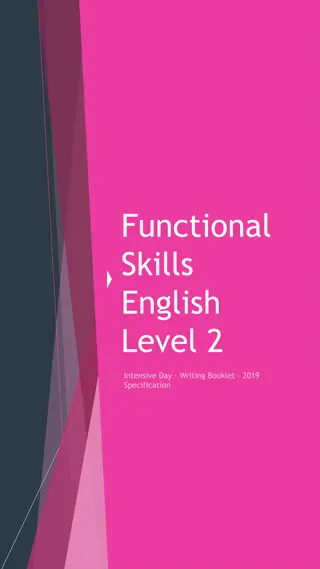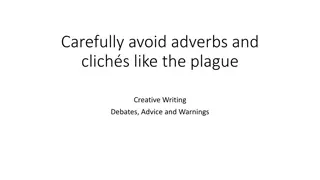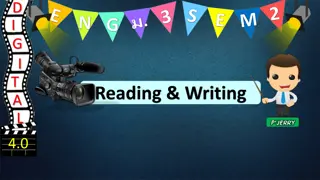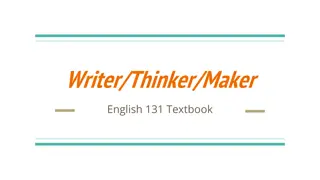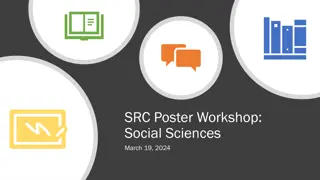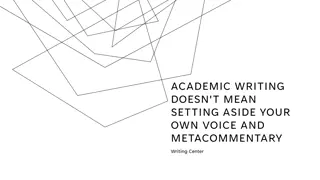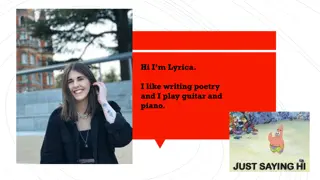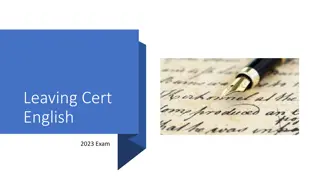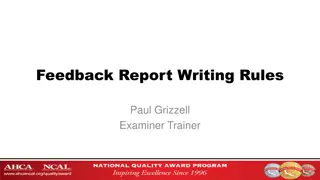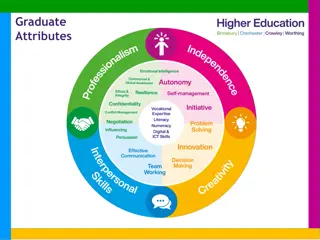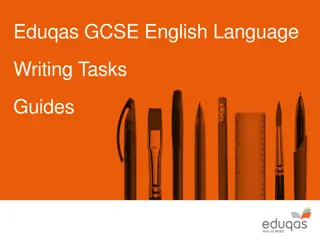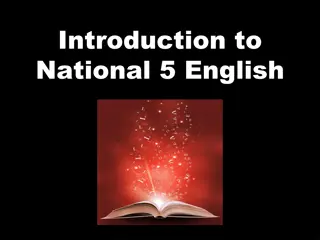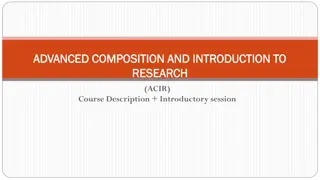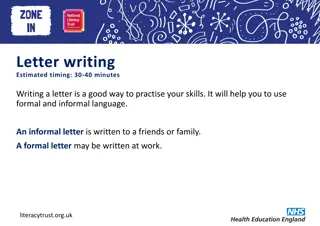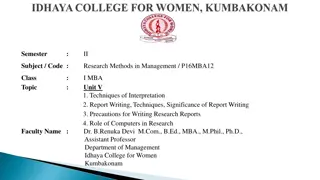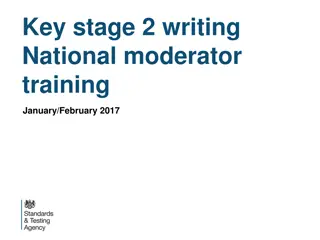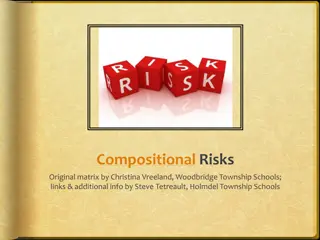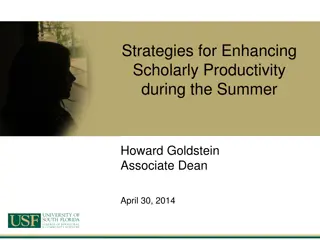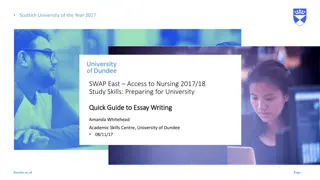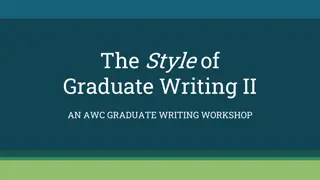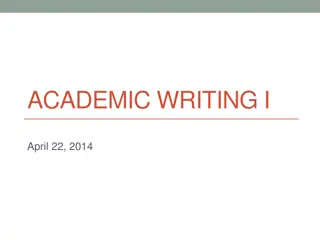Analyzing Neil Gaiman's Writing in "Click Clack the Rattle Bag
Exploring Neil Gaiman's short story "Click Clack the Rattle Bag" in the gothic genre. The story is described as spooky with a mix of dark and funny elements. Readers delve into the unexpected ending and sinister undertones, making it ideal for fans of horror and supernatural themes. The narrative skillfully blends real-life details with a chilling twist that leaves a lasting impact.
Download Presentation

Please find below an Image/Link to download the presentation.
The content on the website is provided AS IS for your information and personal use only. It may not be sold, licensed, or shared on other websites without obtaining consent from the author. Download presentation by click this link. If you encounter any issues during the download, it is possible that the publisher has removed the file from their server.
E N D
Presentation Transcript
LG Listen and respond to Click Clack the Rattle Bag in a general way so we can evaluate what we think of Gaiman s writing in the short story genre.
Have you ever been scared of anything? Monsters under the bed? The dark? Coke? Click Clacks??? This short story is a GOTHIC story. GOTHIC is a genre within fictional writing. It is, by nature, a bit spooky
We will read together for the next few lessons. Follow your teachers reading with your own eyes to search for the answers as we go. This is a strategy called modelled reading , where you can become a stronger reader just by watching how someone else approaches words, using expression and self-correction. While we are reading like this we will also have questions. We read the questions first to know what we are looking for in our reading because, when we are reading for purpose these questions guide us.
A NOTE FOR INCLUSIVE TEACHERS ON HOW TO DIFFERENTIATE FROM HERE PLOT THE STORYLINE AS YOU READ ALONG OVER THESE LESSONS- YOU MIGHT LIKE TO KEEP A QUESTION OR TWO FOR A BRAINSTORM, AND ASK YOUR KIDS TO MAKE PREDICTIONS, DRAW PICTURES TO DEVELOP THEIR UNDERSTANDING OF NARRATIVES.
First, we will listen to a whole reading of Click Clack the Rattle Bag to get an overall feel for the tone/style/feel of the text You are listening for the basic plot and how the words create a tone (dark/light/humours/serious/scary etc.). You will be asked, what do you think of the short story? You must use evidence in your response to this question, so take some notes. Listen to Neil Gaiman read his story here: https://www.youtube.com/watch?v=imLja6Emezo
So, what do you think of the short story Click Clack the Rattle Bag ? I think the story was really spooky, even though it had funny parts. The writing had a lot of dark words and ended really unexpectedly, which was the scariest part for me. I think maybe the boy was ghost I d share this story with people who like horrors and supernatural events. I loved the ending of Click Clack the Rattle Bag. It was great how Gaiman introduced us to the idea that the boy was sinister from the beginning, but I had no idea until the end how bad he was. The mix of real life elements, like coke and curry and how kids are naturally scared of the dark, also drew me in. I got lost in these details so felt more comfortable and then, BAM! The ending! It scared the heck out of me. Like when something jumps out in a horror movie.
Now, lets take a closer look How does Gaiman set his tone? What words does he use? What ideas does he put in your head? Before you take me up to bed, will you tell me a story? Do you actually need me to take you up to bed? I asked the boy. He thought for a moment. Then, with intense seriousness, Yes, actually I think you do. It s because of, I ve finished my homework, and so it s my bedtime, and I am a bit scared. Not very scared. Just a bit. But it is a very big house, and lots of times the lights don t work and it s a sort of dark. I reached over and tousled his hair. I can understand that, I said. It is a very big old house. He nodded. We were in the kitchen, where it was light and warm. I put down my magazine on the kitchen table. What kind of story would you like me to tell you?
Well, he said, thoughtfully. I dont think it should be too scary, because then when I go up to bed, I will just be thinking about monsters the whole time. But if it isn t just a little bit scary then I won t be interested. And you make up scary stories, don t you? I know she says that s what you do. She exaggerates. I write stories, yes. Nothing that s been published, yet, though. And I write lots of different kinds of stories. But you do write scary stories? Yes. The boy looked up at me from the shadows by the door, where he was waiting. Do you know any stories about Click-clack the Rattlebag? I don t think so. Those are the best sorts of stories. Do they tell them at your school? He shrugged. Sometimes. What is the impact of the boy shrugging ? Think about the ending Why does he want the story of the Rattle Bag?
Whats a Click-clack the Rattlebag story? He was a precocious child, and was unimpressed by his sister s boyfriend s ignorance. You could see it on his face. Everybody knows them. I don t, I said, trying not to smile. He looked at me as if he was trying to decide whether or not I was pulling his leg. He said, I think maybe you should take me up to my bedroom, and then you can tell me a story before I go to sleep, but a very not-scary story because I ll be up in my bedroom then, and it s actually a bit dark up there, too. I said, Shall I leave a note for your sister, telling her where we are? You can. But you ll hear when they get back. The front door is very slammy. Precocious means: having developed certain abilities or inclinations at an earlier age than is usual or expected. How does Gaiman make the boy so suss or dark or weird? What words and techniques does he use? We walked out of the warm and cosy kitchen into the hallway of the big house, where it was chilly and draughty and dark. I flicked the light-switch, but nothing happened. The bulb s gone, the boy said. That always happens.
CLIFFHANGER ENDING Next lesson we will go back and recap what we ve just read. For now, imagine you are a writer for a NETFLIX special Create one of those last time on primers to catch your audience up. If you re stuck, start with this: Last time, on Click Clack the Rattle Bag, a freaky little boy OR Create a series of Snapchats that detail the story so far.
LG Read along with and respond to Click Clack the Rattle Bag so we can develop a really good understanding of how simple words and techniques like dialogue can create a tone in gothic fiction.
On the last episode of Click Clack the Rattle Bag Turn to your peer/s and tell them what happened last lesson. How did it start? Who are the characters? Where are they? What has happened so far?
What is the impact of changing sentence lengths (sentence types)? Consider the little boys simple, Yes at the end of this chunk. The bulb s gone, the boy said. That always happens. Our eyes adjusted to the shadows. The moon was almost full, and blue-white moonlight shone in through the high windows on the staircase, down into the hall. We ll be all right, I said. Yes, said the boy, soberly. I am very glad you re here. He seemed less precocious now. His hand found mine, and he held on to my fingers comfortably, trustingly, as if he d known me all his life. I felt responsible and adult. I did not know if the feeling I had for his sister, who was my girlfriend, was love, not yet, but I liked that the child treated me as one of the family. I felt like his big brother, and I stood taller, and if there was something unsettling about the empty house I would not have admitted it for worlds. The stairs creaked beneath the threadbare stair-carpet. Click-clacks, said the boy, are the best monsters ever. Are they from television? I don t think so. I don t think any people know where they come from. Mostly they come from the dark. Good place for a monster to come. Yes.
What is the difference between a house, a nest and a lair? We walked along the upper corridor in the shadows, walking from patch of moonlight to patch of moonlight. It really was a big house. I wished I had a flashlight. They come from the dark, said the boy, holding on to my hand. I think probably they re made of dark. And they come in when you don t pay attention. That s when they come in. And then they take you back to their not nests. What s a word that s like nests, but not? House? No. It s not a house. Lair? He was silent. Then, I think that s the word, yes. Lair. He squeezed my hand. He stopped talking. What are we being set up for by Gaiman using these words and having the characters explore what they mean?
Right. So they take the people who don t pay attention back to their lair. And what do they do then, your monsters? Do they suck all the blood out of you, like vampires? What is the scariest word in this section of text and why?
Right. So they take the people who don t pay attention back to their lair. And what do they do then, your monsters? Do they suck all the blood out of you, like vampires? your Discuss this simple word and the impact it has on the whole story.
Great writing ebbs and flows through tone. Great scary stories RISE and FALL in their action. How does Gaiman do this in this section? He snorted. Vampires don t suck all the blood out of you. They only drink a little bit. Just to keep them going, and, you know, flying around. Click-clacks are much scarier than vampires. I m not scared of vampires, I told him. Me neither. I m not scared of vampires either. Do you want to know what Click-clacks do? They drink you, said the boy. Like a Coke? Coke is very bad for you, said the boy. If you put a tooth in Coke, in the morning, it will be dissolved into nothing. That s how bad coke is for you and why you must always clean your teeth, every night. I d heard the Coke story as a boy, and had been told, as an adult, that it wasn t true, but was certain that a lie which promoted dental hygiene was a good lie, and I let it pass. Could Gaiman do this without dialogue?
Click-clacks drink you, said the boy. First they bite you, and then you go all ishy inside, and all your meat and all your brains and everything except your bones and your skin turns into a wet, milk-shakey stuff and then the Click-clack sucks it out through the holes where your eyes used to be. That s disgusting, I told him. Did you make it up? We d reached the last flight of stairs, all the way in to the big house. No. I can t believe you kids make up stuff like that. You didn t ask me about the rattlebag, he said. Right. What s the rattlebag? Well, he said, sagely, soberly, a small voice from the darkness beside me, once you re just bones and skin, they hang you up on a hook, and you rattle in the wind. Do you think there is a purposeful intent by Gaiman to have the boy literally leading the teenager up the stairs, while leading him through the conversation about the Click Clacks and Rattle Bags? Ask your teacher about metaphors. Or google it! What does sagely mean, and why does this matter? What about soberly ?
So what do these Click-clacks look like? Even as I asked him, I wished I could take the question back, and leave it unasked. I thought: Huge spidery creatures. Like the one in the shower that morning. I m afraid of spiders. I was relieved when the boy said, They look like what you aren t expecting. What you aren t paying attention to. We were climbing wooden steps now. I held on to the railing on my left, held his hand with my right, as he walked beside me. It smelled like dust and old wood, that high in the house. The boy s tread was certain, though, even though the moonlight was scarce. Do you know what story you re going to tell me, to put me to bed? he asked. It doesn t actually have to be scary. Not really. Maybe you could tell me about this evening. Tell me what you did? That won t make much of a story for you. My girlfriend just moved in to a new place on the edge of town. She inherited it from an aunt or someone. It s very big and very old. I m going to spend my first night with her, tonight, so I ve been waiting for an hour or so for her and her housemates to come back with the wine and an Indian takeaway. What isn t the narrator of this story paying attention to? What GAPS do we have about the presence of this little boy? Gaps are bits in a text that the author/creator leaves out intentionally. Sometimes they do this so they can surprise us later on
Fast finishers Make a prediction about the ending by writing your own. Try to copy Gaiman s style. Did you know that a lot of published authors mastered their craft by copying the tone and style of others?
LG Finish reading along with and respond to Click Clack the Rattle Bag so we can develop a really good understanding of how simple words and techniques like dialogue can create a tone in gothic fiction.
On the last episode Watch: https://vimeo.com/246082776
So what do these Click-clacks look like? Even as I asked him, I wished I could take the question back, and leave it unasked. I thought: Huge spidery creatures. Like the one in the shower that morning. I m afraid of spiders. I was relieved when the boy said, They look like what you aren t expecting. What you aren t paying attention to. We were climbing wooden steps now. I held on to the railing on my left, held his hand with my right, as he walked beside me. It smelled like dust and old wood, that high in the house. The boy s tread was certain, though, even though the moonlight was scarce. Do you know what story you re going to tell me, to put me to bed? he asked. It doesn t actually have to be scary. Not really. Maybe you could tell me about this evening. Tell me what you did? That won t make much of a story for you. My girlfriend just moved in to a new place on the edge of town. She inherited it from an aunt or someone. It s very big and very old. I m going to spend my first night with her, tonight, so I ve been waiting for an hour or so for her and her housemates to come back with the wine and an Indian takeaway.
Can anyone remember what precocious means? See? said the boy. There was that precocious amusement again. But all kids can be insufferable sometimes, when they think they know something you don t. It s probably good for them. You know all that. But you don t think. You just let your brain fill in the gaps. He pushed open the door to the attic room. It was perfectly dark, now, but the opening door disturbed the air, and I heard things rattle gently, like dry bones in thin bags, in the slight wind. Click. Clack. Click. Clack. Like that. Why would Gaiman repeat this word? The words that are bigger (I made them bigger, not Gaiman) are a hint What is a clause in the last paragraph that could also be enlarged to warn readers about the ending?
a clause in the last paragraph that could also be enlarged to warn readers about the ending See? said the boy. There was that precocious amusement again. But all kids can be insufferable sometimes, when they think they know something you don t. It s probably good for them. You know all that. But you don t think. You just let your brain fill in the gaps. He pushed open the door to the attic room. It was perfectly dark, now, but the opening door disturbed the air, and I heard things rattle gently, like dry bones in thin bags, in the slight wind. Click. Clack. Click. Clack. Like that.
I would have pulled away, then, if I could, but small, firm fingers pulled me forward, unrelentingly, into the dark.
I would have pulled away, then, if I could, but small, firm fingers pulled me forward, unrelentingly, into the dark. What makes this a unique or powerful ending?
Summary What happened to the guy babysitting? Was the boy real, or a monster, or a ghost, or something else? And why do you think that? - Think about the wordplay with lair, house and nest earlier in the story, and the word precocious , and what other hints did I miss?
Review the writing in this story. How do the words and sentences make you feel at different stages of the story? Work in groups to go back over a printed version of it. Highlight and underline interesting words or sentences including the ones you now know are hints for the audience. Organise your notes so that one group member will share your review with the class. Why would people love this story? Why might someone hate it? Give it a rating out of 5 Rattle Bags.


